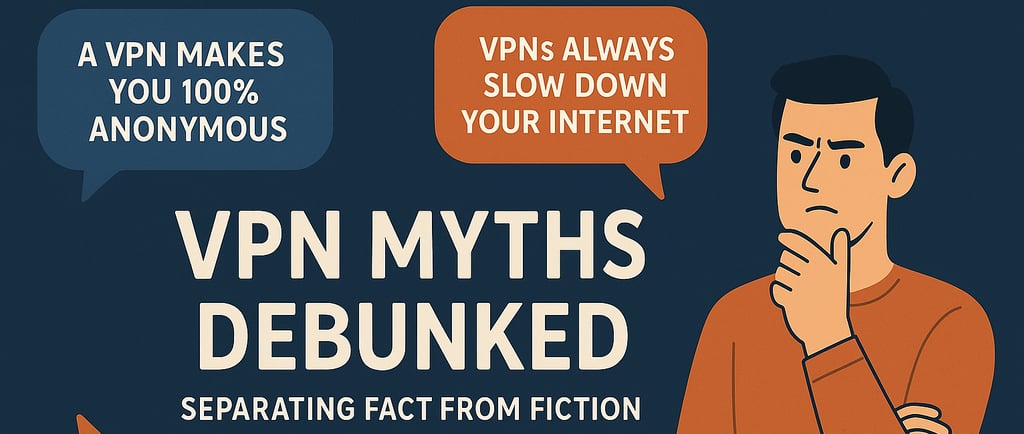Common Myths About VPNs Debunked.
VPN


Common Myths About VPNs Debunked
The popularity of Virtual Private Networks (VPNs) has skyrocketed in recent years. More people are turning to VPNs to secure their online activities, protect personal data, and access global content. But with rising popularity comes plenty of misinformation. From “VPNs are only for hackers” to “they make your internet slow,” myths about VPNs often discourage people from using them.
In this article, we’ll separate fact from fiction and debunk the most common VPN myths you may have heard.
Myth 1: VPNs Are Only for Tech Experts or Hackers
One of the biggest misconceptions about VPNs is that they’re only for tech-savvy individuals, hackers, or businesses with complex IT systems. While it’s true that businesses were among the first to use VPNs, today’s VPN services are designed for everyday users.
Modern VPN apps are easy to install and use. Most have one-click connection features, intuitive interfaces, and mobile apps that even beginners can navigate. You don’t need to be a tech genius to secure your online activities with a VPN—it’s as simple as downloading an app and pressing “connect.”
Myth 2: VPNs Make Your Internet Extremely Slow
Another common belief is that using a VPN will slow your internet to a crawl. While early VPN services sometimes suffered from speed issues, technology has advanced significantly.
Today’s top VPN providers offer high-speed servers optimized for streaming, gaming, and downloading. In fact, depending on your ISP, a VPN can even improve performance by bypassing bandwidth throttling. Although a slight reduction in speed can happen due to encryption, for most users the difference is hardly noticeable.
Myth 3: VPNs Are Illegal
This myth keeps many people from using VPNs. The truth is that in most countries, VPNs are perfectly legal. They’re tools designed to enhance security and privacy, and many businesses rely on them for remote work.
However, some countries with strict internet censorship, such as China or Iran, place heavy restrictions on VPN usage. Even there, it’s not the VPN itself that’s illegal—it’s the act of bypassing government restrictions. For the majority of users worldwide, using a VPN is entirely legal.
Myth 4: Free VPNs Are Just as Good as Paid Ones
Who doesn’t love free services? Unfortunately, when it comes to VPNs, free is often too good to be true. Many free VPNs make money by collecting and selling your data, which defeats the very purpose of using a VPN. Others bombard users with ads or impose strict limits on bandwidth and server access.
A reputable paid VPN service, on the other hand, offers strong encryption, no-logs policies, reliable customer support, and access to thousands of servers worldwide. While free VPNs might work for short-term use, they’re not suitable for long-term privacy or security.
Myth 5: VPNs Make You Completely Anonymous
A VPN enhances privacy, but it doesn’t make you invisible. Some users mistakenly believe that using a VPN means they can do anything online without being tracked. While a VPN hides your IP address and encrypts traffic, other factors like cookies, account logins, and browser fingerprinting can still reveal your identity.
For complete anonymity, you’d need a combination of tools (such as Tor and privacy-focused browsers) along with careful online behavior. Think of a VPN as a shield—it’s powerful, but not impenetrable.
Myth 6: VPNs Are Expensive
People often assume VPNs are costly subscriptions reserved for businesses. In reality, most top VPN services cost just a few dollars a month—often less than the price of a coffee. Many providers offer discounts for yearly plans and even money-back guarantees. Given the security and privacy benefits, VPNs are one of the most affordable cybersecurity tools available today.
Myth 7: You Don’t Need a VPN if You Have Antivirus Software
While antivirus software protects against malware and viruses, it doesn’t encrypt your data or hide your IP address. Think of antivirus as protecting your device, while a VPN protects your connection. They complement each other but serve different purposes. For maximum protection, it’s best to use both.
Conclusion
VPNs have been surrounded by myths that discourage people from using them. The reality is that VPNs are simple, affordable, and effective tools that improve your security, privacy, and freedom online. They’re not only for hackers, they don’t cripple your internet speed, and they’re legal in most parts of the world.
By understanding what VPNs truly do—and don’t do—you can make informed decisions about protecting your digital life.